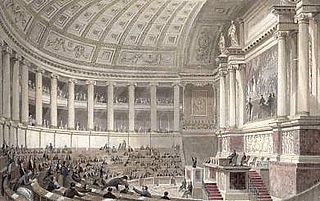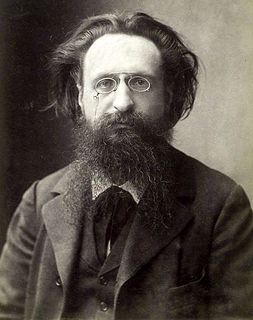
The Dreyfus Affair was a political scandal that divided the Third French Republic from 1894 until its resolution in 1906. The affair is often seen as a modern and universal symbol of injustice, and it remains one of the most notable examples of a complex miscarriage of justice and antisemitism. The major role played by the press and public opinion proved influential in the lasting social conflict.
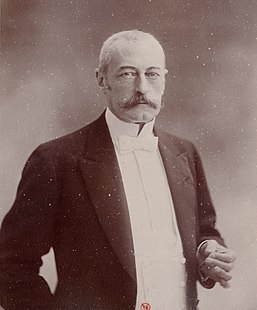
Pierre Marie René Ernest Waldeck-Rousseau was a French Republican politician, who served 29th Prime Minister of France.

Émile François Loubet was the 45th Prime Minister of France and later President of France.

Jules Guérin was a French journalist and anti-Semitic activist. He founded and led the Ligue Antisemitique, an organisation similar to the Ligue des Patriotes, and edited the French weekly L'Antijuif (fr).
The Democratic Alliance, originally called Democratic Republican Alliance, was a French political party created in 1901 by followers of Léon Gambetta such as Raymond Poincaré, who would be president of the Council in the 1920s. The party was at first conceived by members of the Radical-Socialist Party tied to the business world who united themselves in May 1901 along with many moderates as gathering centre-left liberals and Opportunist Republicans. However, after World War I and the parliamentary disappearance of monarchists and Bonapartists it quickly became the main centre-right party of the Third Republic. It was part of the National Bloc right-wing coalition which won the elections after the end of the war. The ARD successively took the name Parti Républicain Démocratique and then Parti Républicain Démocratique et Social before becoming again the AD.
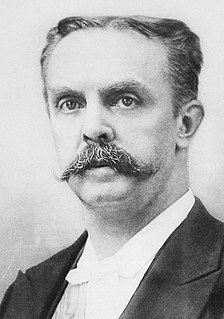
The 1893 general election was held on 20 August and 3 September 1893.

The 1902 general election was held on 27 April and 11 May 1902.
The Moderates or Moderate Republicans, pejoratively labeled Opportunist Republicans, were a French political group active in the late 19th century during the Third French Republic. The leaders of the group included Jules Ferry, Jules Grévy, Henri Wallon and René Waldeck-Rousseau.
The Lefts Bloc was a coalition of Republican political forces created during the French Third Republic in 1899 to contest the 1902 legislative elections. It initially supported Emile Combes's cabinet, then Maurice Rouvier's cabinet and finally Maurice Rouvier's cabinet. The Republican Coalition dissolved itself after the International Socialist Congress of Amsterdam of 1904 and the subsequent withdrawal of Socialist ministers from the government. Although the Left won the 1906 legislative election, the Socialists did not repeat their alliances with the Radicals and the Radical-Socialists and other Republican forces.
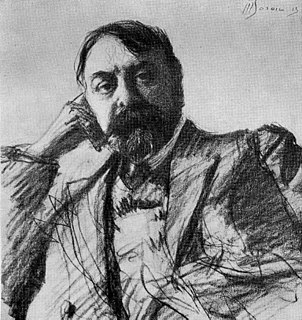
Henri Vaugeois was a French teacher and journalist who was one of the founders of right-wing nationalist Action Française movement.
Events from the year 1898 in France.

Jean-Baptiste Billot was a French general and politician.
The Progressive Republicans were a parliamentary group in France active during the late 19th century during the French Third Republic.

Ludovic Trarieux was a French Republican statesman, prominent Dreyfusard, and pioneer of international human rights.

Félix Jules Méline was a French statesman, prime minister from 1896 to 1898.
Ernest Granger was a French politician, a veteran of the Paris Commune of 1871, a Blanquist socialist and subsequently a Boulangist nationalist.

Jean-Baptiste Darlan was a French politician who was Minister of Justice in 1896–97.

Victor Édouard Milliard was a French politician who was Minister of Justice for a few months in 1897–98.
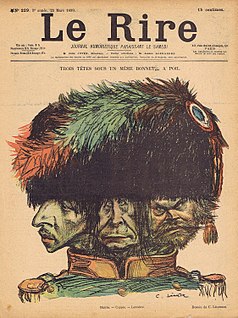
The Ligue de la patrie française was a French nationalist and anti-Dreyfus organization. It was officially founded in 1899, and brought together leading right-wing artists, scientists and intellectuals. The league fielded candidates in the 1902 national elections, but was relatively unsuccessful. After this it gradually became dormant. The bulletin ceased publication in 1909.

Albert Gauthier de Clagny was a right-wing French politician during the period before World War I. He was a respected lawyer, a Bonapartist and an anti-Dreyfusard.
